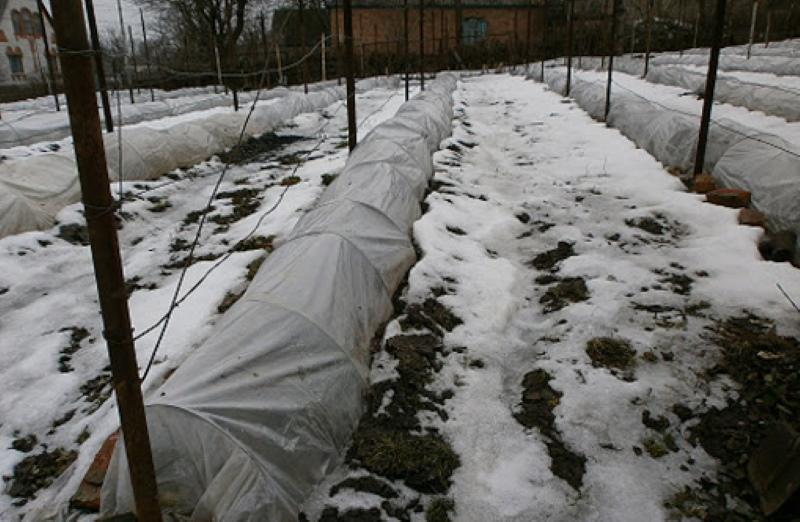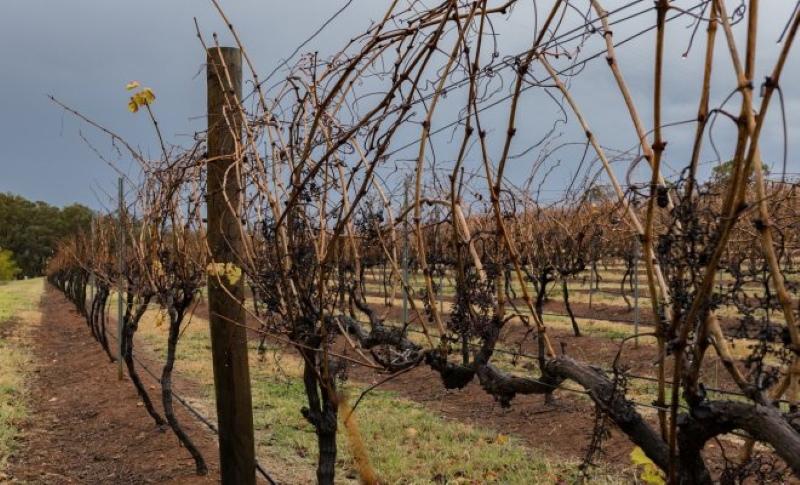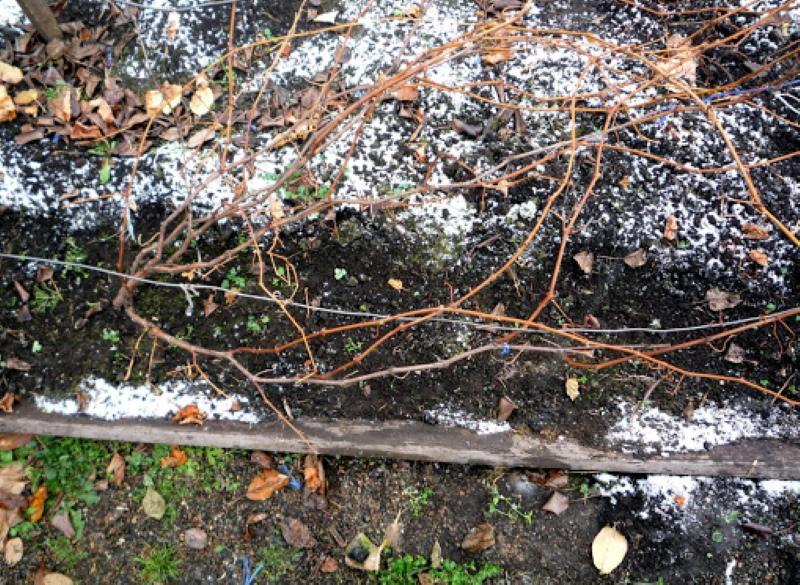We decide on the timing and ways of covering grapes for the winter
 It is no secret that grapes are a thermophilic culture, and only the southern regions were lucky enough to grow it without shelter. In the rest of our homeland, plants need additional protection. Knowing when and how to shelter grapes for the winter, you can prevent freezing, especially of young growth. Even modern frost-resistant hybrids show their characteristics mainly in relation to lignified shoots. A green young vine is vulnerable to low temperatures and requires protection. Maximum help is needed for one-year-old young seedlings who have not yet had time to get strong enough. Their first wintering should be under cover. How to organize it and in what time frame?
It is no secret that grapes are a thermophilic culture, and only the southern regions were lucky enough to grow it without shelter. In the rest of our homeland, plants need additional protection. Knowing when and how to shelter grapes for the winter, you can prevent freezing, especially of young growth. Even modern frost-resistant hybrids show their characteristics mainly in relation to lignified shoots. A green young vine is vulnerable to low temperatures and requires protection. Maximum help is needed for one-year-old young seedlings who have not yet had time to get strong enough. Their first wintering should be under cover. How to organize it and in what time frame?
When to start hiding a vineyard

The specific dates depend on the growing region and its climate. Where autumn ends quickly, they cover already in the month of October. And, conversely, in late winter, you can start the procedure at the very end of autumn and even in December.
The general rule is this: you need to wait for frosts at least minus 5 ° C and let the bushes stand for about 5 days. And only then, when the shoots are hardened, cover.
How to shelter grapes for the winter
 Each grower has his own favorite and reliable way to protect the vineyard from severe frosts. Most often, plants are covered using:
Each grower has his own favorite and reliable way to protect the vineyard from severe frosts. Most often, plants are covered using:
- land;
- snow;
- straw;
- slate;
- spandbond;
- spruce branches.
Earthen shelter
 The vine is removed, placed in a previously dug trench and covered with soil. It is advisable to do this in two passes, first filling a layer of about 10 cm, and after 3 weeks increase it by 2 times. The method is the cheapest, absolutely cost-free, but not suitable for northern regions. There, even such a layer of soil will freeze if it is not additionally protected from above.
The vine is removed, placed in a previously dug trench and covered with soil. It is advisable to do this in two passes, first filling a layer of about 10 cm, and after 3 weeks increase it by 2 times. The method is the cheapest, absolutely cost-free, but not suitable for northern regions. There, even such a layer of soil will freeze if it is not additionally protected from above.
Snow shelter
 Plywood or boards are laid out under the bushes, the vine is settled on them, if necessary, they are fixed with staples. When it snows, they cover it with snow and maintain the height of the snow cover at least 50 cm. This method is also not expensive, but it has a lot of disadvantages. What if there is simply no snow, and the frosts are already good? For winters with little snow, it is worth using other methods, moreover, if there is a thaw, then such a shelter will simply melt.
Plywood or boards are laid out under the bushes, the vine is settled on them, if necessary, they are fixed with staples. When it snows, they cover it with snow and maintain the height of the snow cover at least 50 cm. This method is also not expensive, but it has a lot of disadvantages. What if there is simply no snow, and the frosts are already good? For winters with little snow, it is worth using other methods, moreover, if there is a thaw, then such a shelter will simply melt.
Thatched shelter
 The vine is also laid on plywood and covered with a layer of straw at least 40 cm thick on top. The method is good, moreover, it is environmentally friendly, but you need to look for straw and think about how to protect it from the wind. In addition, in the spring, such a shelter is inconvenient to dismantle.
The vine is also laid on plywood and covered with a layer of straw at least 40 cm thick on top. The method is good, moreover, it is environmentally friendly, but you need to look for straw and think about how to protect it from the wind. In addition, in the spring, such a shelter is inconvenient to dismantle.
Shelter from slate
 Instead of slate, you can take old boards or roofing material remaining after repair. Then you won't have to spend money on materials. First, they dig trenches, where the vine is laid, but first it is wrapped in burlap. The moat is covered with slate and covered with earth. The method is absolutely reliable: the grapes do not freeze, the shelter is resistant to the wind. The only thing you need to have such solid materials. It's too expensive to buy them on purpose.
Instead of slate, you can take old boards or roofing material remaining after repair. Then you won't have to spend money on materials. First, they dig trenches, where the vine is laid, but first it is wrapped in burlap. The moat is covered with slate and covered with earth. The method is absolutely reliable: the grapes do not freeze, the shelter is resistant to the wind. The only thing you need to have such solid materials. It's too expensive to buy them on purpose.
Spandbond for sheltering grapes
 An excellent covering material that can be used in any region, even in the north. You can put it directly on the trellis and fix or wrap the vine removed from the support, laying it on the ground. These are options for a warm winter, but if the frosts are strong, then the vine is first covered with straw.
An excellent covering material that can be used in any region, even in the north. You can put it directly on the trellis and fix or wrap the vine removed from the support, laying it on the ground. These are options for a warm winter, but if the frosts are strong, then the vine is first covered with straw.
Lapnik
 Another natural way and not expensive for those who live near the forest. The vine is simply laid and covered with spruce or pine branches. Under such a shelter, the grapes are warm, and there are no rodents with fungi.
Another natural way and not expensive for those who live near the forest. The vine is simply laid and covered with spruce or pine branches. Under such a shelter, the grapes are warm, and there are no rodents with fungi.